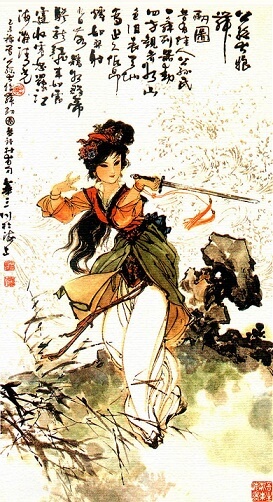A Song of Dagger-dancing to a Girl-pupil of Lady Gongsun
- Poetry of Du Fu

On the 19th of the Tenth-month in the second year of Dali, I saw, in the house of the Kueifu official Yuante, a girl named Li from Lingying dancing with a dagger. I admired her skill and asked who was her teacher. She named Lady Gongsun. I remembered that in the third year of Kaiyuan at Yancheng, when I was a little boy, I saw Lady Gongsun dance. She was the only one in the Imperial Theatre who could dance with this weapon. Now she is aged and unknown, and even her pupil has passed the heyday of beauty. I wrote this poem to express my wistfulness. The work of Zhang Xu of the Wu district, that great master of grassy writing, was improved by his having been present when Lady Gongsun danced in the Yeh district. From this may be judged the art of Gongsun.
There lived years ago the beautiful Gongsun,
Who, dancing with her dagger, drew from all four quarters
An audience like mountains lost among themselves.
Heaven and earth moved back and forth, following her motions,
Which were bright as when the Archer shot the nine suns down the sky
And rapid as angels before the wings of dragons.
She began like a thunderbolt, venting its anger,
And ended like the shining calm of rivers and the sea....
But vanished are those red lips and those pearly sleeves;
And none but this one pupil bears the perfume of her fame,
This beauty from Lingying, at the Town of the White God,
Dancing still and singing in the old blithe way.
And while we reply to each other's questions,
We sigh together, saddened by changes that have come.
There were eight thousand ladies in the late Emperor's court,
But none could dance the dagger-dance like Lady Gongsun.
...Fifty years have passed, like the turning of a palm;
Wind and dust, filling the world, obscure the Imperial House.
Instead of the Pear-Garden Players, who have blown by like a mist,
There are one or two girl-musicians now-trying to charm the cold Sun.
There are man-size trees by the Emperor's Golden Tomb
I seem to hear dead grasses rattling on the cliffs of Qutang.
...The song is done, the slow string and quick pipe have ceased.
At the height of joy, sorrow comes with the eastern moon rising.
And I, a poor old man, not knowing where to go,
Must harden my feet on the lone hills, toward sickness and despair.
Seven-character-ancient-verse
This poem was composed in the second year of the Dali era of Emperor Daizong of the Tang Dynasty (767 AD), during Du Fu's stay in Kuizhou (present-day Fengjie, Chongqing). At the time, the Tang Dynasty was in decline, and the aftermath of the An Lushan Rebellion had yet to subside. While staying at the residence of Yuan Chi, the Deputy Magistrate of Kuizhou, Du Fu watched a performance of the "Sword Dance" by Li Shiniang, a disciple of Gongsun Daniang. Moved by the decline of the once-prosperous era and the scattering of the imperial troupe, as well as his own displacement, Du Fu wrote this poem to express his sorrow over the passage of time and the changing world.
大历二年十月十九日,夔府别驾元持宅见临颍李十二娘舞剑器,壮其蔚跂。问其所师,曰︰“余公孙大娘弟子也。”开元三载,余尚童稚,记于郾城观公孙氏舞剑器浑脱。浏漓顿挫,独出冠时。自高头宜春梨园二伎坊内人,洎外供奉,晓是舞者,圣文神武皇帝初,公孙一人而已。玉貌锦衣,况余白首!今兹弟子亦匪盛颜。既辨其由来,知波澜莫二。抚事慷慨,聊为《剑器行》。昔者吴人张旭善草书书帖,数尝于邺县见公孙大娘舞西河剑器,自此草书长进,豪荡感激。即公孙可知矣!
昔有佳人公孙氏,一舞剑器动四方。
观者如山色沮丧,天地为之久低昂。
㸌如羿射九日落,矫如群帝骖龙翔。
来如雷霆收震怒,罢如江海凝青光。
绛唇珠袖两寂寞,晚有弟子传芬芳。
临颍美人在白帝,妙舞此曲神扬扬。
与余问答既有以,感时抚事增惋伤。
先帝侍女八千人,公孙剑器初第一。
五十年间似反掌,风尘澒洞昏王室。
梨园弟子散如烟,女乐馀姿映寒日。
金粟堆南木已拱,瞿塘石城草萧瑟。
玳筵急管曲复终,乐极哀来月东出。
老夫不知其所往,足茧荒山转愁疾。
- Why Chinese poems is so special?
- The most distinctive features of Chinese poetry are: concision- many poems are only four lines, and few are much longer than eight; ambiguity- number, tense and parts of speech are often undetermined, creating particularly rich interpretative possibilities; and structure- most poems follow quite strict formal patterns which have beauty in themselves as well as highlighting meaningful contrasts.
- How to read a Chinese poem?
- Like an English poem, but more so. Everything is there for a reason, so try to find that reason. Think about all the possible connotations, and be aware of the different possibilities of number and tense. Look for contrasts: within lines, between the lines of each couplet and between successive couplets. Above all, don't worry about what the poet meant- find your meaning.
- An Early Audience at the Palace of Light, Harmonizing Secretary Jia Zhi's Poem
- Farewell to a Japanese Monk
- Watching the Hunt
- The Lake Qi
- The Pepper Garden
- Mengcheng Mound
- A Boat in Spring on Jo-Ya Lake
- Night at Longxing Temple
- The Abbot’s Hut
- Passing by Monk Rong’s Hermitage